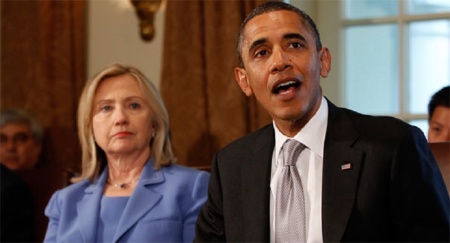Hillary Clinton, Siding With Republicans, Criticizes Obama's 'Don't Do Stupid Stuff' Iraq, ISIS, Syria Policies

In a lengthy foreign policy interview for The Atlantic, former Secretary of State Hillary Clinton echoed many of the same critiques of President Barack Obama's "don't do stupid stuff" foreign policy mantra recently offered by Republicans.
"Great nations need organizing principles, and 'Don't do stupid stuff' is not an organizing principle," Clinton told Jeffrey Goldberg in the interview conducted early last week and published Sunday.
Several Republican leaders have also argued that a counterterrorism strategy is needed. Those criticisms have been especially loud since Obama announced on Thursday that he would attack ISIS, also called Islamic State or ISIL. In announcing the attacks, Obama and other White House officials were clear in communicating that it was not part of a long term strategy to deal with ISIS.
"This was not an authorization of a broad-based counterterrorism campaign against ISIL," one White House official stated.
In a Friday morning statement, Speaker of the House John Boehner said he supported the bombing of ISIS, but added: "The president needs a long-term strategy — one that defines success as completing our mission, not keeping political promises — and he needs to build the public and congressional support to sustain it."
Clinton's critique was softer than Boehner's. Most of the criticism came after Goldberg pushed for more detail in her answers, and she praised Obama as well, calling him "thoughtful" and "incredibly smart." Yet, many of her positions would seem strikingly familiar to anyone who follows the foreign policy concerns of many Republicans.
On the current conflict between Israel and Hamas, Clinton said Hamas bore "ultimate responsibility," offered a defense of Israel, and said many of the nation's critics are driven by anti-Semitism.
Goldberg, an award winning journalist who specializes in the Middle East, offered some analysis of the interview in the article. Though Clinton served in the Obama administration, she is beginning to distance herself from Obama ahead of an apparent presidential bid, Goldberg reasoned.
In 2008, Clinton was narrowly bested by Obama in the race to become the Democratic presidential nominee. In the interview, Clinton positions her herself between Obama and Obama's predecessor, President George W. Bush.
"Do you think the next administration, whoever it is, can find some harmony between muscular intervention — 'We must do something' — vs. let's just not do something stupid, let's stay away from problems like Syria because it's a wicked problem and not something we want to tackle?" Goldberg asked.
"I think part of the challenge is that our government too often has a tendency to swing between these extremes," she answered. "The pendulum swings back and then the pendulum swings the other way. What I'm arguing for is to take a hard look at what tools we have. Are they sufficient for the complex situations we're going to face, or not? And what can we do to have better tools? I do think that is an important debate."
Clinton also implied that if Obama had heeded her advice on Syria and backed certain U.S.-friendly rebel groups, ISIS may not be the threat that it is today.
After Goldberg pointed out that Obama argues that arming Syrian rebels would have made no difference, Clinton replied, "Well, I did believe, which is why I advocated this, that if we were to carefully vet, train, and equip early on a core group of the developing Free Syrian Army, we would, number one, have some better insight into what was going on on the ground. Two, we would have been helped in standing up a credible political opposition, ... ."
Sen. Lindsay Graham (R-S.C.) referenced Clinton's early advice to Obama on Fox News Sunday.
"This commander in chief has no strategy. He has no vision. This is a situation of where, he knows better than everybody else. He was told, 'you should get engaged in Syria,' three years ago by his national security team. He said 'no,'" Graham argued.
Clinton was less harsh than Graham and qualified her answers by saying that she does not know what would have happened if Obama had followed her advice.
Goldberg continued to press the question, asking directly, "Do you think we'd be where we are with ISIS right now if the U.S. had done more three years ago to build up a moderate Syrian opposition?"
After repeating that she does not know the answer, Clinton added, "I know that the failure to help build up a credible fighting force of the people who were the originators of the protests against Assad — there were Islamists, there were secularists, there was everything in the middle — the failure to do that left a big vacuum, which the jihadists have now filled."
When asked to describe her "organizing principle," Clinton began her answer with a pithy three word response that could fit on a "Clinton 2016" bumper sticker: "Peace, progress and prosperity." To read the rest of her answer, check out the whole interview here.





















